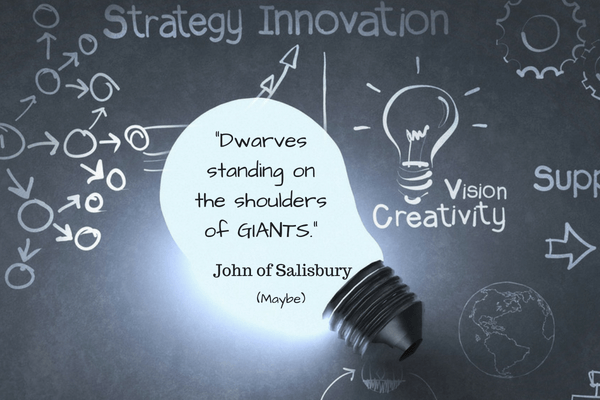
YouTube / iTunes / Spotify / Radio Public / Pocket Casts / Google Podcasts / Breaker / Overcast
Listen to ArtisanEnglish.jp posts & lesson intros here.
Metaphor: Dwarves standing on the shoulders of giants
Have you ever thought that we are dwarves standing on the shoulders of giants?
Just look around for a moment.
Someone who came before us invented everything we have in life, enabling us to live the convenient, safe, leisurely lives we have today.
All of the discoveries made today build upon the previous findings of men and women such as Pasteur, Curie, Einstein, McClintock and Tesla.
Dwarves standing on the shoulders of giants means societies seek and find truth by building on the previous discoveries of great people.
We may feel that we are living in an advanced society and that we, meaning present-day humans, have been able to conquer the world due to our prowess and intelligence.
In fact, we are dwarves standing on the shoulders of giants.
Before you start telling yourself that David is so bright and he came up with a great metaphor to share with us, I need to explain something.
First, yes, I am smart and thank you so much for noticing that.
I appreciate it; I do.
Second, no, I did not come up with this metaphor all by myself.
I, you see, am also one of the dwarves standing on the shoulders of giants.
As far as I can tell, it was initially said by a theologian named John of Salisbury way back in 1159 or another guy named Bernard of Chartres, also in the 12th century.
Third, it means that modern societies can search for and find truth only by building on the discoveries of incredible men and women who came before us.
You see, each individual working alone can only scratch the surface of knowledge and truth.
With that in mind, what makes humans great is that by working together and building on each other’s discoveries, we can continue to advance and find the truth.
The present always moves forward by standing on the accomplishments of the past.
Have a great week, everyone, and if you’re afraid of heights, don’t look down.
Flesch-Kincaid Readability Test
This post is understandable by someone with at least a 7th-grade education (age 12).
On the Flesch-Kincaid reading-ease test, this post scores 70.
The easier a passage is to read, the higher the score on a scale of 0 – 100.

